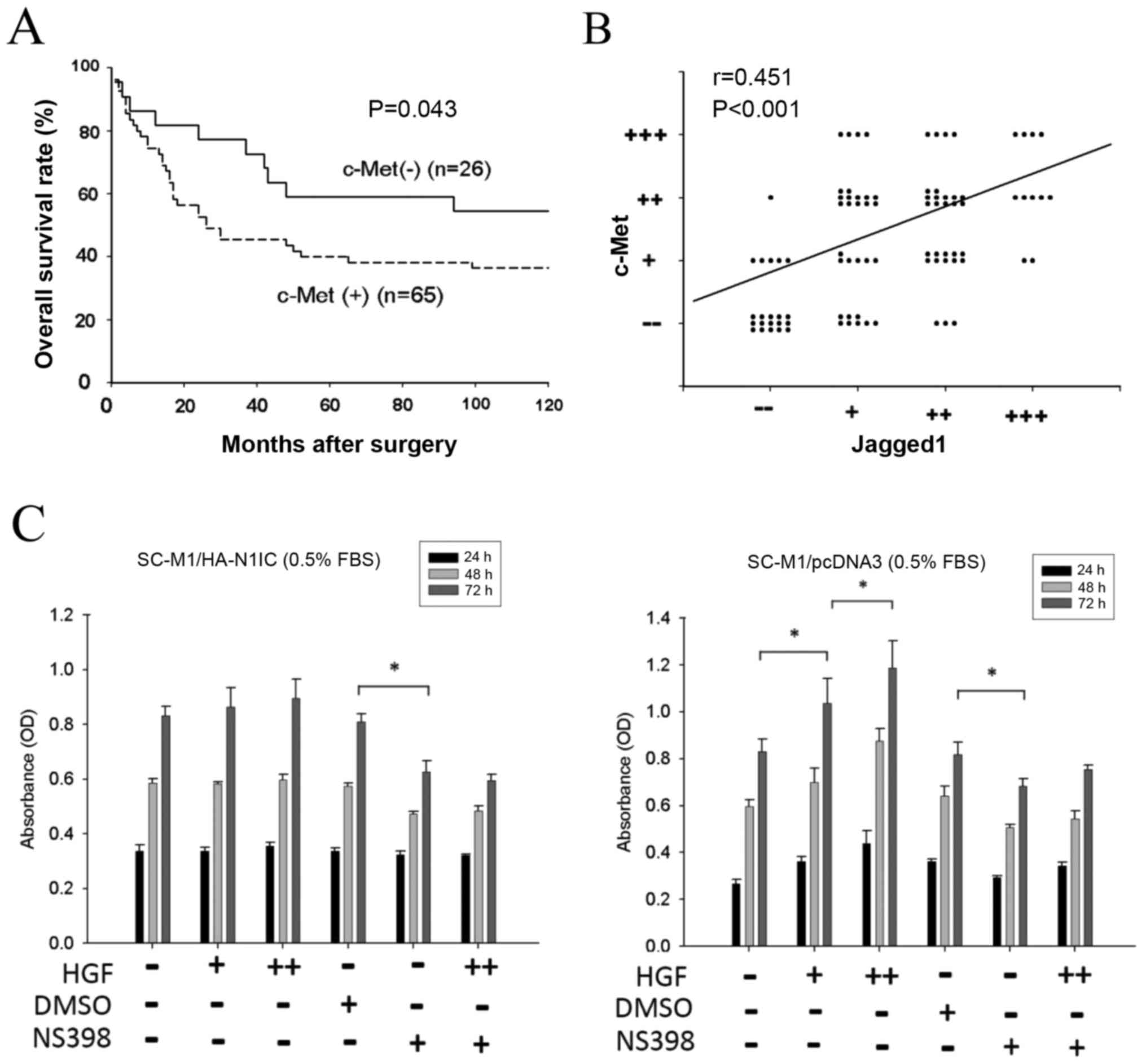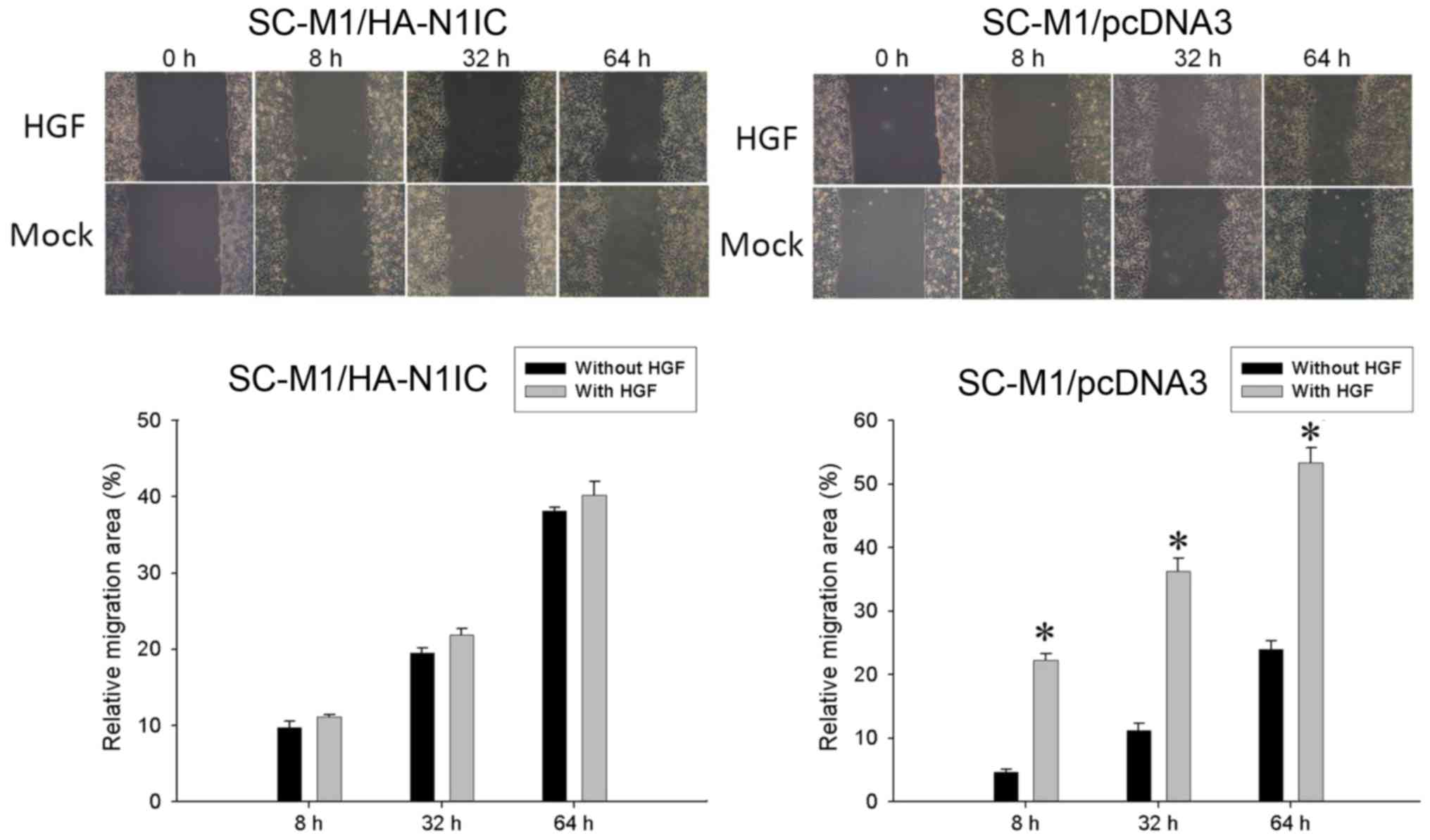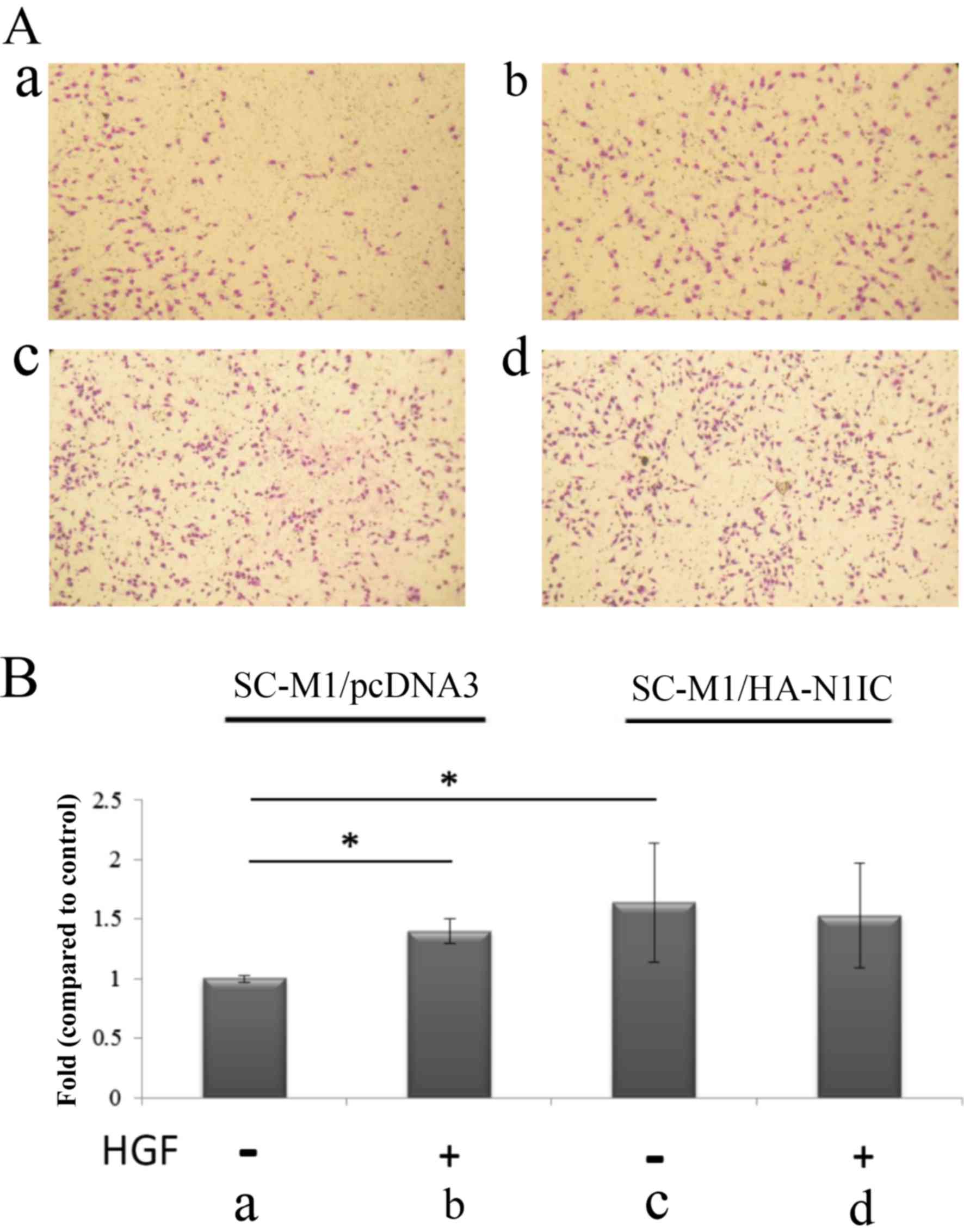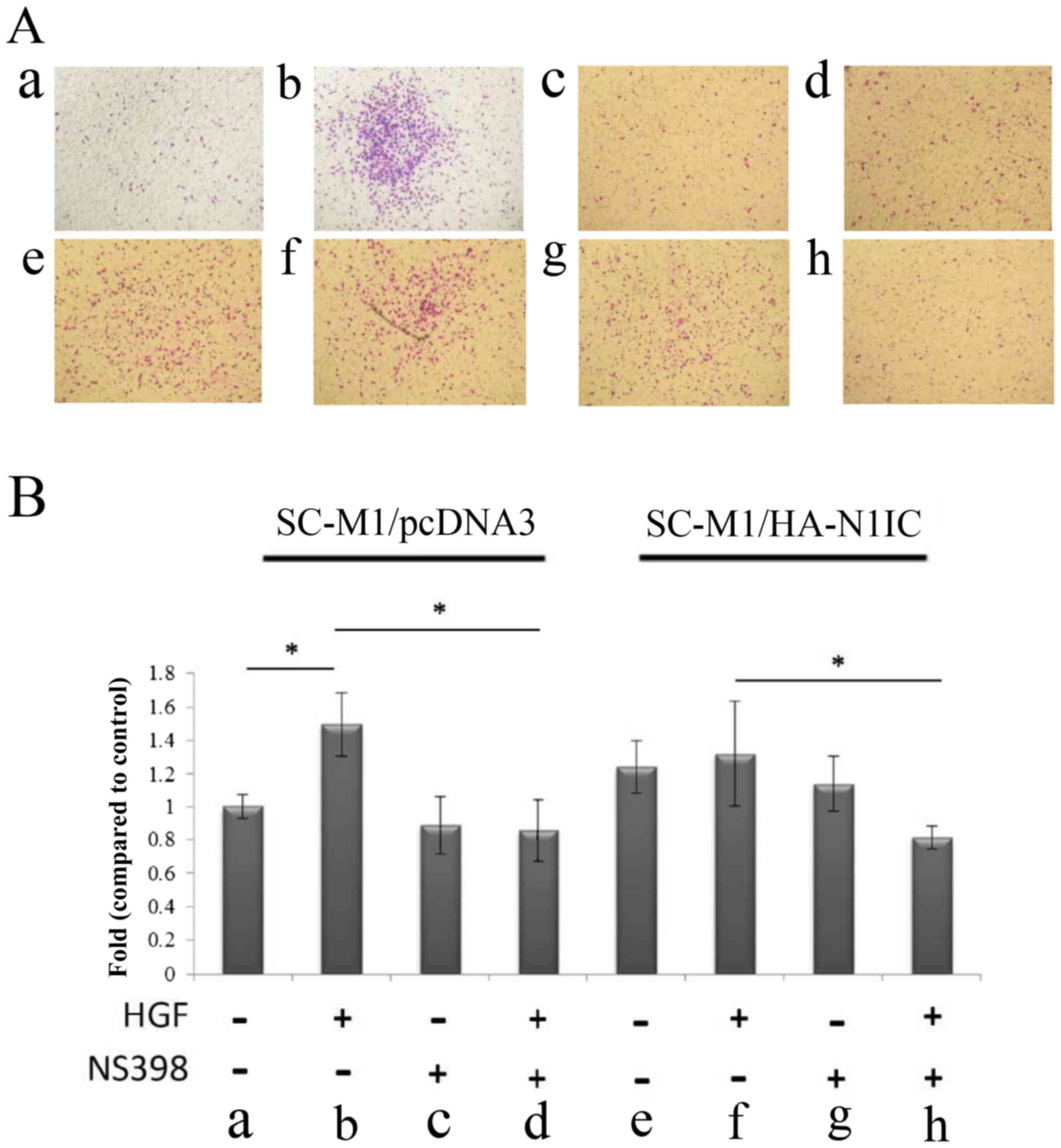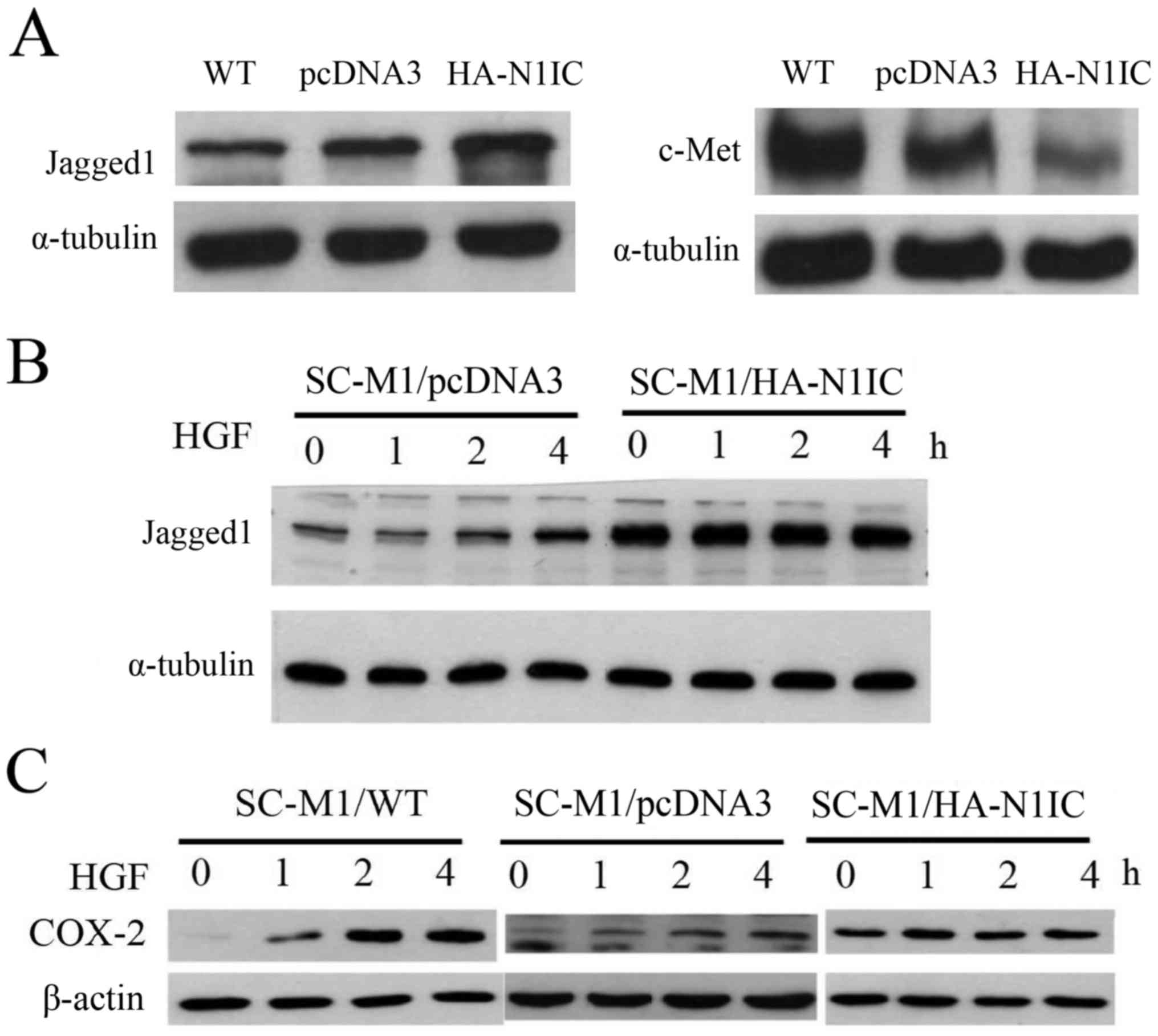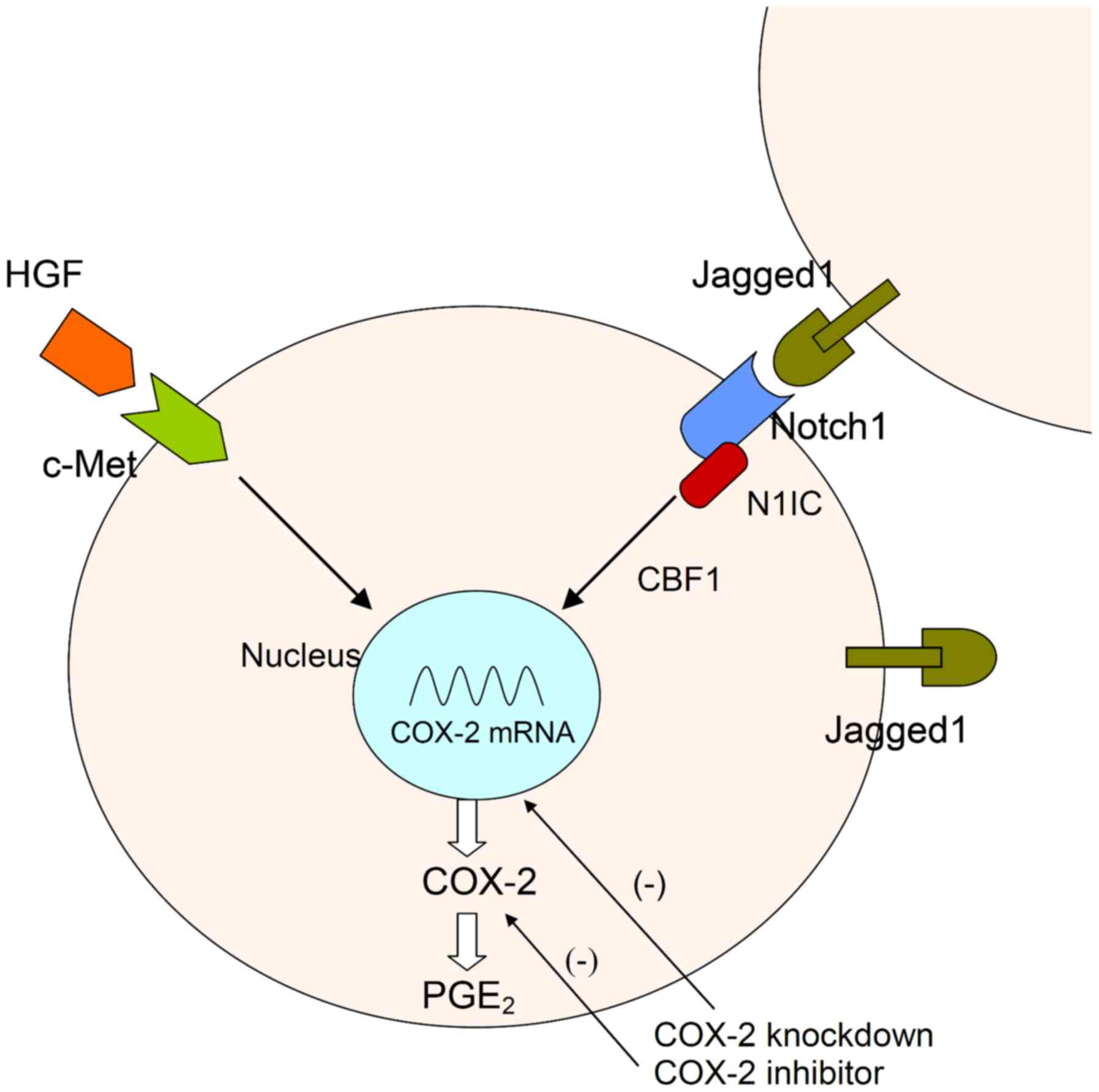|
1
|
Ferlay J, Soerjomataram I, Dikshit R, Eser
S, Mathers C, Rebelo M, Parkin DM, Forman D and Bray F: Cancer
incidence and mortality worldwide: Sources, methods and major
patterns in GLOBOCAN 2012. Int J Cancer. 136:E359–E386. 2015.
View Article : Google Scholar : PubMed/NCBI
|
|
2
|
Chen JH, Wu CW, Kao HL, Chang HM, Li AFY,
Liu TY and Chi CW: Effects of COX-2 inhibitor on growth of human
gastric cancer cells and its relation to hepatocyte growth factor.
Cancer Lett. 239:263–270. 2006. View Article : Google Scholar : PubMed/NCBI
|
|
3
|
Yeh TS, Wu CW, Hsu KW, Liao WJ, Yang MC,
Li AFY, Wang AM, Kuo ML and Chi CW: The activated Notch1 signal
pathway is associated with gastric cancer progression through
cyclooxygenase-2. Cancer Res. 69:5039–5048. 2009. View Article : Google Scholar : PubMed/NCBI
|
|
4
|
Jones MK, Sasaki E, Halter F, Pai R,
Nakamura T, Arakawa T, Kuroki T and Tarnawski AS: HGF triggers
activation of the COX-2 gene in rat gastric epithelial cells:
Action mediated through the ERK2 signaling pathway. FASEB J.
13:2186–2194. 1999. View Article : Google Scholar : PubMed/NCBI
|
|
5
|
Amemiya H, Kono K, Itakura J, Tang RF,
Takahashi A, An FQ, Kamei S, Iizuka H, Fujii H and Matsumoto Y:
c-Met expression in gastric cancer with liver metastasis. Oncology.
63:286–296. 2002. View Article : Google Scholar : PubMed/NCBI
|
|
6
|
Christensen JG, Burrows J and Salgia R:
c-Met as a target for human cancer and characterization of
inhibitors for therapeutic intervention. Cancer Lett. 225:1–26.
2005. View Article : Google Scholar : PubMed/NCBI
|
|
7
|
Chappell WH, Green TD, Spengeman JD,
McCubrey JA, Akula SM and Bertrand FE: Increased protein expression
of the PTEN tumor suppressor in the presence of constitutively
active Notch-1. Cell Cycle. 4:1389–1395. 2005. View Article : Google Scholar : PubMed/NCBI
|
|
8
|
Lindsell CE, Shawber CJ, Boulter J and
Weinmaster G: Jagged: A mammalian ligand that activates Notch1.
Cell. 80:909–917. 1995. View Article : Google Scholar : PubMed/NCBI
|
|
9
|
Hsu KW, Hsieh RH, Huang KH, Li Fen-Yau A,
Chi CW, Wang TY, Tseng MJ, Wu KJ and Yeh TS: Activation of the
Notch1/STAT3/Twist signaling axis promotes gastric cancer
progression. Carcinogenesis. 33:1459–1467. 2012. View Article : Google Scholar : PubMed/NCBI
|
|
10
|
Ohno R, Yoshinaga K, Fujita T, Hasegawa K,
Iseki H, Tsunozaki H, Ichikawa W, Nihei Z and Sugihara K: Depth of
invasion parallels increased cyclooxygenase-2 levels in patients
with gastric carcinoma. Cancer. 91:1876–1881. 2001. View Article : Google Scholar : PubMed/NCBI
|
|
11
|
Shi H, Xu JM, Hu NZ and Xie HJ: Prognostic
significance of expression of cyclooxygenase-2 and vascular
endothelial growth factor in human gastric carcinoma. World J
Gastroenterol. 9:1421–1426. 2003. View Article : Google Scholar : PubMed/NCBI
|
|
12
|
Lim HY, Joo HJ, Choi JH, Yi JW, Yang MS,
Cho DY, Kim HS, Nam DK, Lee KB and Kim HC: Increased expression of
cyclooxygenase-2 protein in human gastric carcinoma. Clin Cancer
Res. 6:519–525. 2000.PubMed/NCBI
|
|
13
|
Huang TT, Ping YH, Wang AM, Ke CC, Fang
WL, Huang KH, Lee HC, Chi CW and Yeh TS: The reciprocal regulation
loop of Notch2 pathway and miR-23b in controlling gastric
carcinogenesis. Oncotarget. 6:18012–18026. 2015.PubMed/NCBI
|
|
14
|
Hsu KW, Fang WL, Huang KH, Huang TT, Lee
HC, Hsieh RH, Chi CW and Yeh TS: Notch1 pathway-mediated
microRNA-151-5p promotes gastric cancer progression. Oncotarget.
7:38036–38051. 2016. View Article : Google Scholar : PubMed/NCBI
|
|
15
|
Stella MC, Trusolino L, Pennacchietti S
and Comoglio PM: Negative feedback regulation of Met-dependent
invasive growth by Notch. Mol Cell Biol. 25:3982–3996. 2005.
View Article : Google Scholar : PubMed/NCBI
|
|
16
|
Wu CW, Chi CW, Su TL, Liu TY, Lui WY and
P'eng FK: Serum hepatocyte growth factor level associate with
gastric cancer progression. Anticancer Res. 18:3657–3659.
1998.PubMed/NCBI
|
|
17
|
Wu CW, Li AFY, Chi CW, Chung WW, Liu TY,
Lui WY and P'eng FK: Hepatocyte growth factor and Met/HGF receptors
in patients with gastric adenocarcinoma. Oncol Rep. 5:817–822.
1998.PubMed/NCBI
|
|
18
|
Lin JS, Lu CW, Huang CJ, Wu PF, Robinson
D, Kung HJ, Chi CW, Wu CW, Yang WK, Whang-Peng JJ, et al:
Protein-tyrosine kinase and protein-serine/threonine kinase
expression in human gastric cancer cell lines. J Biomed Sci.
5:101–110. 1998. View Article : Google Scholar : PubMed/NCBI
|
|
19
|
Uen YH, Lin SR, Wu CH, Hsieh JS, Lu CY, Yu
FJ, Huang TJ and Wang JY: Clinical significance of MUC1 and c-Met
RT-PCR detection of circulating tumor cells in patients with
gastric carcinoma. Clin Chim Acta. 367:55–61. 2006. View Article : Google Scholar : PubMed/NCBI
|
|
20
|
Boccaccio C and Comoglio PM: Invasive
growth: A MET-driven genetic programme for cancer and stem cells.
Nat Rev Cancer. 6:637–645. 2006. View
Article : Google Scholar : PubMed/NCBI
|
|
21
|
Yamamoto H, Itoh F, Fukushima H, Hinoda Y
and Imai K: Overexpression of cyclooxygenase-2 protein is less
frequent in gastric cancers with microsatellite instability. Int J
Cancer. 84:400–403. 1999. View Article : Google Scholar : PubMed/NCBI
|
|
22
|
Gual P, Giordano S, Williams TA, Rocchi S,
Van Obberghen E and Comoglio PM: Sustained recruitment of
phospholipase C-γ to Gab1 is required for HGF-induced branching
tubulogenesis. Oncogene. 19:1509–1518. 2000. View Article : Google Scholar : PubMed/NCBI
|
|
23
|
Maroun CR, Naujokas MA, Holgado-Madruga M,
Wong AJ and Park M: The tyrosine phosphatase SHP-2 is required for
sustained activation of extracellular signal-regulated kinase and
epithelial morphogenesis downstream from the met receptor tyrosine
kinase. Mol Cell Biol. 20:8513–8525. 2000. View Article : Google Scholar : PubMed/NCBI
|
|
24
|
Zeng Q, Li S, Chepeha DB, Giordano TJ, Li
J, Zhang H, Polverini PJ, Nor J, Kitajewski J and Wang CY:
Crosstalk between tumor and endothelial cells promotes tumor
angiogenesis by MAPK activation of Notch signaling. Cancer Cell.
8:13–23. 2005. View Article : Google Scholar : PubMed/NCBI
|
|
25
|
King AM, Van der Put E, Blomberg BB and
Riley RL: Accelerated Notch-dependent degradation of E47 proteins
in aged B cell precursors is associated with increased ERK MAPK
activation. J Immunol. 178:3521–3529. 2007. View Article : Google Scholar : PubMed/NCBI
|
|
26
|
Gude NA, Emmanuel G, Wu W, Cottage CT,
Fischer K, Quijada P, Muraski JA, Alvarez R, Rubio M, Schaefer E,
et al: Activation of Notch-mediated protective signaling in the
myocardium. Circ Res. 102:1025–1035. 2008. View Article : Google Scholar : PubMed/NCBI
|
|
27
|
The Cancer Genome Atlas Research Network,
. Bass AJ, Thorsson V, Shmulevich I, Reynolds SM, Miller M, Bernard
B, Hinoue T, Laird PW, Curtis C, Shen H, et al: Comprehensive
molecular characterization of gastric adenocarcinoma. Nature.
513:202–209. 2014. View Article : Google Scholar : PubMed/NCBI
|
|
28
|
Gravalos C and Jimeno A: HER2 in gastric
cancer: A new prognostic factor and a novel therapeutic target. Ann
Oncol. 19:1523–1529. 2008. View Article : Google Scholar : PubMed/NCBI
|
|
29
|
Peruzzi B and Bottaro DP: Targeting the
c-Met signaling pathway in cancer. Clin Cancer Res. 12:3657–3660.
2006. View Article : Google Scholar : PubMed/NCBI
|
|
30
|
Nickoloff BJ, Osborne BA and Miele L:
Notch signaling as a therapeutic target in cancer: A new approach
to the development of cell fate modifying agents. Oncogene.
22:6598–6608. 2003. View Article : Google Scholar : PubMed/NCBI
|
|
31
|
Katoh M and Katoh M: Notch ligand, JAG1,
is evolutionarily conserved target of canonical WNT signaling
pathway in progenitor cells. Int J Mol Med. 17:681–685.
2006.PubMed/NCBI
|















